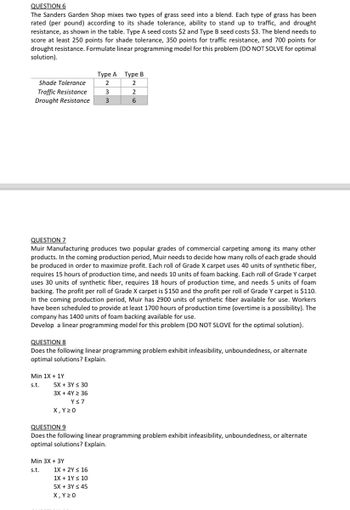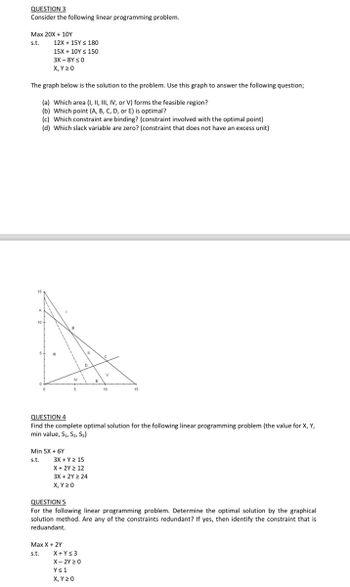
Practical Management Science
6th Edition
ISBN: 9781337406659
Author: WINSTON, Wayne L.
Publisher: Cengage,
expand_more
expand_more
format_list_bulleted
Question

Transcribed Image Text:QUESTION 6
The Sanders Garden Shop mixes two types of grass seed into a blend. Each type of grass has been
rated (per pound) according to its shade tolerance, ability to stand up to traffic, and drought
resistance, as shown in the table. Type A seed costs $2 and Type B seed costs $3. The blend needs to
score at least 250 points for shade tolerance, 350 points for traffic resistance, and 700 points for
drought resistance. Formulate linear programming model for this problem (DO NOT SOLVE for optimal
solution).
Shade Tolerance
Traffic Resistance
Type A Type B
2
2
3
2
6
Drought Resistance 3
QUESTION 7
Muir Manufacturing produces two popular grades of commercial carpeting among its many other
products. In the coming production period, Muir needs to decide how many rolls of each grade should
be produced in order to maximize profit. Each roll of Grade X carpet uses 40 units of synthetic fiber,
requires 15 hours of production time, and needs 10 units of foam backing. Each roll of Grade Y carpet
uses 30 units of synthetic fiber, requires 18 hours of production time, and needs 5 units of foam
backing. The profit per roll of Grade X carpet is $150 and the profit per roll of Grade Y carpet is $110.
In the coming production period, Muir has 2900 units of synthetic fiber available for use. Workers
have been scheduled to provide at least 1700 hours of production time (overtime is a possibility). The
company has 1400 units of foam backing available for use.
Develop a linear programming model for this problem (DO NOT SLOVE for the optimal solution).
QUESTION 8
Does the following linear programming problem exhibit infeasibility, unboundedness, or alternate
optimal solutions? Explain.
Min 1X + 1Y
s.t.
5X + 3YS 30
3X+4Y ≥ 36
Y≤7
X, Y≥O
QUESTION 9
Does the following linear programming problem exhibit infeasibility, unboundedness, or alternate
optimal solutions? Explain.
Min 3X + 3Y
s.t.
1X + 2Y ≤ 16
1X + 1Y≤ 10
5X+3Y ≤ 45
X, Y≥O

Transcribed Image Text:QUESTION 3
Consider the following linear programming problem.
Max 20x + 10Y
s.t.
12X+15Y≤ 180
15X+10Y ≤ 150
3X-8Y≤0
X, Y≥O
The graph below is the solution to the problem. Use this graph to answer the following question;
(a) Which area (I, II, III, IV, or V) forms the feasible region?
(b) Which point (A, B, C, D, or E) is optimal?
(c) Which constraint are binding? (constraint involved with the optimal point)
(d) Which slack variable are zero? (constraint that does not have an excess unit)
A
10
E
V
10
QUESTION 4
Find the complete optimal solution for the following linear programming problem (the value for X, Y,
min value, S1, S2, S3)
Min 5X + 6Y
s.t.
3X + Y ≥ 15
X+2Y≥ 12
3X+2Y ≥ 24
X, Y≥0
QUESTION 5
For the following linear programming problem. Determine the optimal solution by the graphical
solution method. Are any of the constraints redundant? If yes, then identify the constraint that is
reduandant.
Max X + 2Y
s.t.
X+Y≤3
X-2Y≥0
Y≤ 1
X, Y≥0
Expert Solution
This question has been solved!
Explore an expertly crafted, step-by-step solution for a thorough understanding of key concepts.
Step by stepSolved in 2 steps with 10 images

Knowledge Booster
Similar questions
- Beeson Co. is experiencing a decrease in sales and operating income for the fiscal year ending December 31st. Julia Faure, controller of Beeson Co., has suggested that all orders received before the end of the fiscal year be shipped by midnight, December 31st even if shipping department must work overtime. Since Beeson Co. ships all merchandise FOB shipping point, it would record all such shipments as sales for the year ending December 31st, thereby offsetting some of the decreases in sales and operating income.Discuss whether Julia Faure is behaving in a professional manner and what are the implications of her actions?arrow_forwardallons of deionized water from each wholesaler to each distribution center is shown in the following table: Question Viewer a. Which of the following statements regarding setting up the tableau for the optimal solution for this problem is true? B. The sum of supply capacities is greater than the sum of demands, so a dummy distribution center is needed. C. The sum of supply capacities is less than the sum of demands, so a dummy wholesaler is needed. b. What is the total cost of the solution? The optimal cost is $ ((Enter your response rounded to the nearest dollar.)arrow_forward14arrow_forward
- Q: The Morton Supply Company produces clothing, footwear, and accessories for dancing and gymnastics. They produce three models of pointe shoes used by ballerinas to balance on the tips of their toes. The shoes are produced from four materials: cardstock, satin, plain fabric, and leather. The number of square inches of each type of material used in each model of shoe, the amount of material available, and the profit/model are shown below: Material (measured in square inches) Model 1 Model 2 Model 3 Material Available Cardstock 12 10 14 1200 Satin 24 20 15 2000 Plain fabric 40 40 30 7500 Leather 11 11 10 1000 Profit per model $50 $44 $40 a) Generate the Sensitivity Report in EXCEL for the model that you built. Interpret, in context, the Shadow Price for the Leather and the Satin constraints. Include units in your interpretations.arrow_forwardUsing the 1st law of Thermodynamics solve the following problem and the format of the answer is as follow a.) given:b) required:c solution : The 2M Company supplies 50 kilograms of chicken to ABEst Restaurant, which is contained in a box at 6°C, and is to be frozen at-18°C. The container box is 1.5 kg and the specific heat of the box material is 1.4 kJ/kg-°C. The freezing temperature of chicken is -2.8 °C. Determine the amount of heat that needs to be removedarrow_forwardTaylor Smith owns a small clothing company, Cuteness for You, that offers an online subscription and personal shopping service targeted at busy families with children aged newborn to five years old. Currently, Taylor has one level of subscription service, the standard service. For $100 a month, the standard service provides its customers a monthly delivery of 10 clothing items carefully chosen to match the child's size, gender, and emerging style. The online clothing subscription market is fairly new but is growing rapidly and thus Taylor is considering extending the product line to increase its market share and profits. Taylor is debating whether to add a premium subscription service featuring profitable high-markup items for $125 per month, a basic subscription service that contains lower-markup popular items priced at $75 per month, or possibly both. Taylor knows that the new product lines provide an opportunity to attract more customers and possibly increase revenues and profit,…arrow_forward
arrow_back_ios
arrow_forward_ios
Recommended textbooks for you
 Practical Management ScienceOperations ManagementISBN:9781337406659Author:WINSTON, Wayne L.Publisher:Cengage,
Practical Management ScienceOperations ManagementISBN:9781337406659Author:WINSTON, Wayne L.Publisher:Cengage, Operations ManagementOperations ManagementISBN:9781259667473Author:William J StevensonPublisher:McGraw-Hill Education
Operations ManagementOperations ManagementISBN:9781259667473Author:William J StevensonPublisher:McGraw-Hill Education Operations and Supply Chain Management (Mcgraw-hi...Operations ManagementISBN:9781259666100Author:F. Robert Jacobs, Richard B ChasePublisher:McGraw-Hill Education
Operations and Supply Chain Management (Mcgraw-hi...Operations ManagementISBN:9781259666100Author:F. Robert Jacobs, Richard B ChasePublisher:McGraw-Hill Education
 Purchasing and Supply Chain ManagementOperations ManagementISBN:9781285869681Author:Robert M. Monczka, Robert B. Handfield, Larry C. Giunipero, James L. PattersonPublisher:Cengage Learning
Purchasing and Supply Chain ManagementOperations ManagementISBN:9781285869681Author:Robert M. Monczka, Robert B. Handfield, Larry C. Giunipero, James L. PattersonPublisher:Cengage Learning Production and Operations Analysis, Seventh Editi...Operations ManagementISBN:9781478623069Author:Steven Nahmias, Tava Lennon OlsenPublisher:Waveland Press, Inc.
Production and Operations Analysis, Seventh Editi...Operations ManagementISBN:9781478623069Author:Steven Nahmias, Tava Lennon OlsenPublisher:Waveland Press, Inc.

Practical Management Science
Operations Management
ISBN:9781337406659
Author:WINSTON, Wayne L.
Publisher:Cengage,

Operations Management
Operations Management
ISBN:9781259667473
Author:William J Stevenson
Publisher:McGraw-Hill Education

Operations and Supply Chain Management (Mcgraw-hi...
Operations Management
ISBN:9781259666100
Author:F. Robert Jacobs, Richard B Chase
Publisher:McGraw-Hill Education


Purchasing and Supply Chain Management
Operations Management
ISBN:9781285869681
Author:Robert M. Monczka, Robert B. Handfield, Larry C. Giunipero, James L. Patterson
Publisher:Cengage Learning

Production and Operations Analysis, Seventh Editi...
Operations Management
ISBN:9781478623069
Author:Steven Nahmias, Tava Lennon Olsen
Publisher:Waveland Press, Inc.